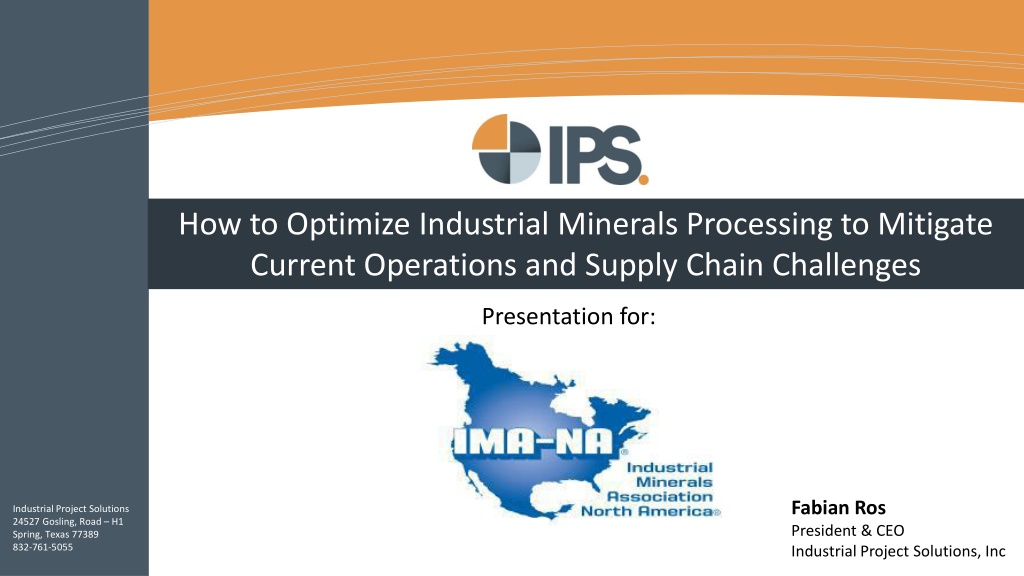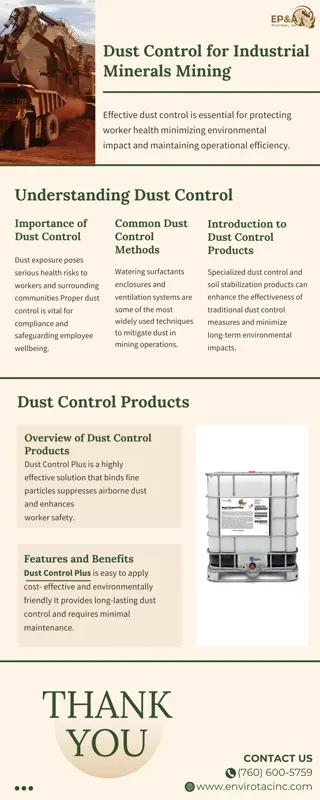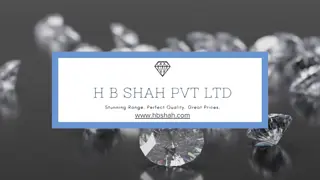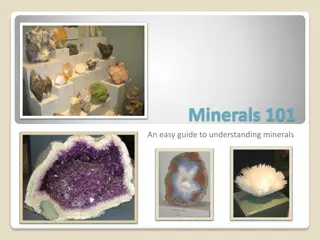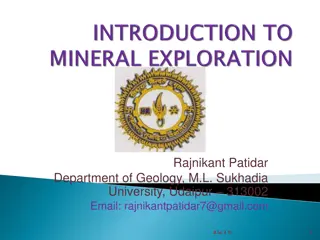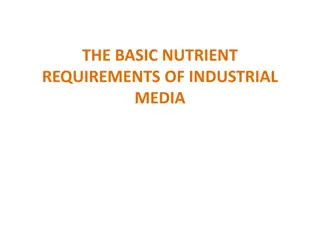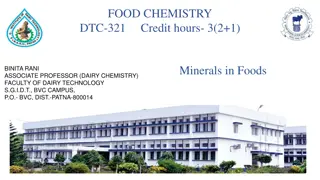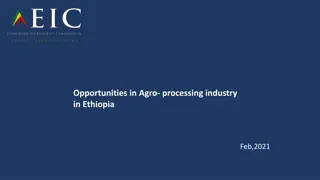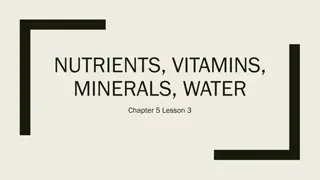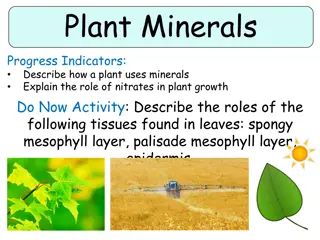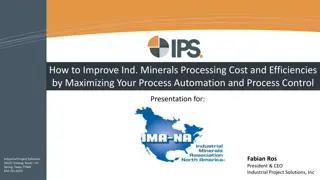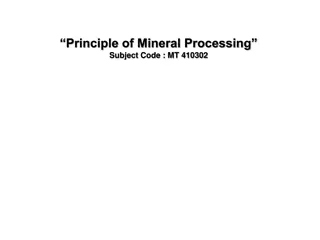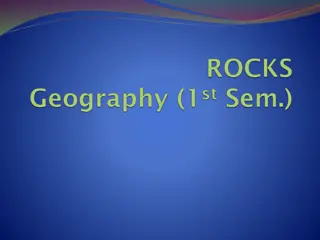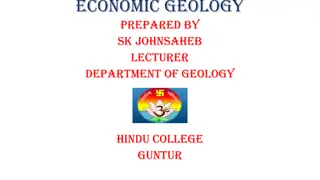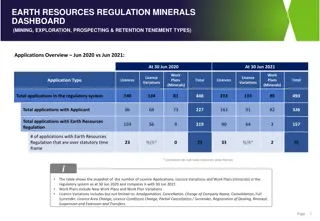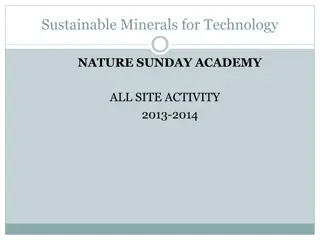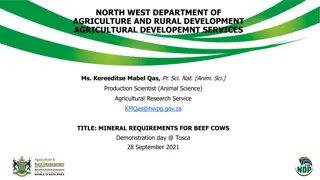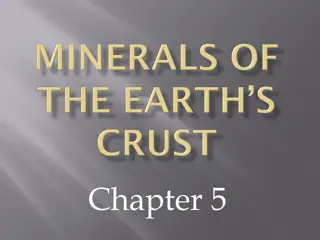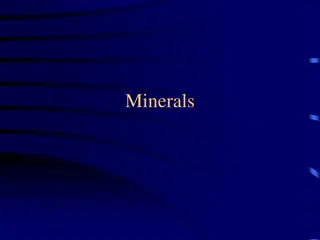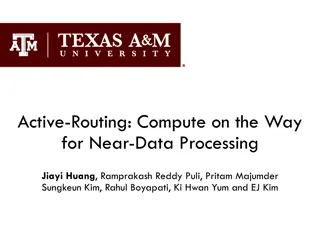Strategies to Optimize Industrial Minerals Processing
Industrial minerals processing involves managing operating costs, optimizing plant utilization, and improving process yield. Explore ways to mitigate challenges in current operations and supply chain issues for enhanced efficiency and cost-effectiveness. Learn about key elements such as raw materials, labor, energy, and indirect costs, as well as opportunities to save on initial costs. Discover typical operating cost indicators and how improving plant utilization can lead to increased production and efficiency.
Download Presentation

Please find below an Image/Link to download the presentation.
The content on the website is provided AS IS for your information and personal use only. It may not be sold, licensed, or shared on other websites without obtaining consent from the author. Download presentation by click this link. If you encounter any issues during the download, it is possible that the publisher has removed the file from their server.
E N D
Presentation Transcript
How to Optimize Industrial Minerals Processing to Mitigate Current Operations and Supply Chain Challenges Presentation for: Fabian Ros President & CEO Industrial Project Solutions, Inc Industrial Project Solutions 24527 Gosling, Road H1 Spring, Texas 77389 832-761-5055
Operating Cost The operating cost of many Industrial Mineral Processing has the following main elements: Raw Materials Labor Energy Plant utilization Yield or Recovery Rate Indirect Cost
Operating Cost Initial Cost Saving Opportunities: Raw Materials Labor Energy Plant Utilization Plant Yield Indirect Cost
Typical Operating Cost Indicators Raw Materials - $ / Produced Ton Labor- Man Hour / Produced Ton Energy KWhr/BTUhr/ Produced Ton Plant Utilization- Percent of Produced Ton / Plant Name Plate Capacity Plant Yield- Raw Material / Produce Product Rate Indirect Cost- $ / Produced Ton
Operating Cost Improving the Plant Utilization Allows us to Increase the Plant Production: Lower Labor Cost Lower Indirect Cost Improving the Process Yield Allow us to Increase the Plant Efficiency : Lower Raw Materials Cost Lower Labor Cost Reduce Energy Consumption
Control Operating Cost Plant Utilization , Process Optimization & Process Yield Raw Materials Labor Energy Indirect Cost
Plant Utilization PROD. RATE >= N.P. CAPACITY PLANT OP. IS AT OPTIMUM UTILIZATION YES NO LABOR RELATED PROBLEM DISCUSS SPECIFICS ISSUES WITH HR & UPPER MANAGEMENT YES NO EQUIPMENT RELATED PROBLEMS
Plant Utilization EQUIPMENT RELATED PROBLEMS YES EQ. PROCESS ANALISYS OVERLOAD DON T KNOW NO SPARE PARTS SHORTAGES REVISE PARTS INVENTORY PRACTICES NO YES REVISE PREV. MAINT. ROUTINES
Process Analysis Process analysis consists in a detail review and evaluation of each individual process that is executed in a industrial mineral or manufacturing processing facility. It is an elaborated process that requires: Advanced process knowledge Multidiscipline technical expertise Adequate instrumentation Adequate system controls Mind openness
Mind Openness Many times the process analysis results uncover problems that the plant was probably aware of but they ignored or not gave them enough importance making the problems part of the standard process. For the process analysis to be successful and constructive it requires that the plant be open and receptive.
Operating Cost Plant Utilization , Process Optimization & Process Yield Raw Materials Labor Power Indirect Cost
Process Optimization Systematic Approach Identifying and Correcting Primary Production Constrains Identifying and Evaluating Secondary Production Constrains Determining if it Worth Addressing the Secondary Constrain or Not.
Process Optimization PROCESS IS UNDER CONTROL NO DON T KNOW PROCESS ANALISYS YES CORRECT PROCESS CAN THE PROCESS BE IMPROVED PROCESS ANALISYS NO CONFIRM YES PROCESS IS OP.OPTIMUM CONDITIONS DEVELOP PROCESS IMPROVEMENTS
Process Control Process Under Control Process Out of Control Predict Energy Consumption Control Labor Requirements Increase Raw Material Yield Energy Consumption Unpredictable Poor Material Yield Unknown Labor Requirements
Operating Cost Plant Utilization , Process Optimization & Process Yield Raw Materials Labor Energy Indirect Cost
Process Yield Optimization Involves Understanding The Finished Product Application Understanding The Clients Needs Knowing The Current Process Constrains Sales, Process And Operations Involvement To Develop An Alternate Product. Clients Accepting An Alternate Product. It Must A Win-win Process For It To Work
Process Yield Optimization REVIEW PRODUCT SPECIFICATION DEVELOPE ALT. HIGH YIELD PRODUCT PERFORM PROCESS CHANGES OFFER ALT HIGH YIELD PRODUCT ALT.PROD. CUSTOMER ACCEPTANCE PROC. OPTIMATION EFFORT COMPLETE PROC. OPTIMATION EFFORT COMPLETE NO YES
Successful Examples of Process Yield Optimization Frac Sand Industry Prod. Evolution 2009 Product Resin Coated Sands High Cost Product Low Production 2011 Product Natural Sands 20/40; 30/50; 40/70 Reject Minus 70 mesh Approx. 30% 2012 Product Natural Sands 20/40; 30/50; 40/70 & 100 Mesh Reject Minus 140 mesh Approx. 10% 2016 Product Natural Sands 20/40; 30/50; 40/70; 50/120 Mesh Reject Approx. 5% 2017- Today Product Depended on sand availability, fracture performance
Operating Cost Plant Utilization , Process Optimization & Process Yield Raw Materials Labor Energy Indirect Cost
Conclusions Effective Cost Control: Is Not As Simple As Other Traditional Cost Cutting Practices It Requires Engagement From All Levels And Areas (Operations, Maintenance, Sales, Logistics And Upper Management) Most Of The Time It Requires Capital Investment Constantly Evolves, It Depends On Market Conditions And Clients Needs It Required Innovation And Openness It Takes Time thing That Worth Take Time To Achieve Trust The Process And Do Not Be Afraid
Trust the Process and Do Not be Afraid St. John Paul II DO NOT BE AFRAID
Conclusions A highly efficient operation: Lower energy consumption Require less plant personnel Protect the environment Maximize the investors return of investment.
